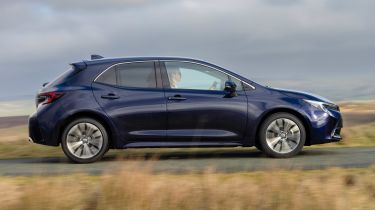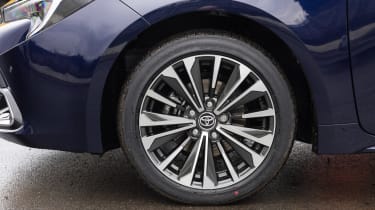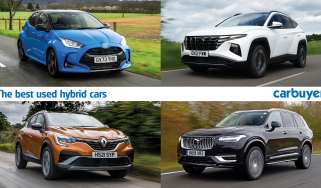Toyota Corolla hatchback - MPG, running costs & CO2
Toyota's hassle-free 'self-charging hybrid' technology doesn't require a plug socket
In many ways, the Toyota Corolla is the right car at the right time. As diesel engines continue to fall out of popularity and electric cars still remain relatively expensive to buy, the petrol self-charging hybrid Toyota Corolla is not only affordable to buy, it’s incredibly efficient and doesn’t require plugging in overnight, either.
Instead, its small battery pack is recharged every time you slow down, using recuperated kinetic energy. It can’t drive on electric power for significant distances like a plug-in hybrid but there are still significant fuel savings to be had. Toyota has made the Corolla’s battery pack smaller, yet more efficient for 2023, meaning the hybrid family hatch consumes even less petrol than before.
The 1.8-litre petrol hybrid is the cheapest version of the Corolla to buy, yet it remains very efficient. Toyota claims the 1.8-litre Corolla will return up to 64.1mpg on the combined WLTP test, which is far ahead of petrol-powered rivals such as the 1.2-litre Vauxhall Astra and matches figures from the likes of the 1.5-litre EcoBoost diesel Ford Focus. CO2 emissions range from 100 to 111g/km, which puts the Corolla in a middling Benefit-in-Kind tax bracket, beaten only by rival plug-in hybrids and EVs.
More reviews
The more powerful 2.0-litre hybrid is not only faster than its 1.8-litre sibling, but is surprisingly just as economical. Once again, this version of the Corolla will return up to 64.1mpg – depending on exact specification – and emits even less CO2, ranging from 98 to 108g/km.
Some buyers may find Toyota’s lack of a Corolla-sized EV puzzling, however. While rival brands have launched electric models including the Nissan Leaf, Volkswagen ID.3 and Citroen e-C4, Toyota’s smallest EV so far is the bZ4X SUV.
|
Model |
Fuel economy |
CO2 emissions |
|
1.8 Hybrid |
60.1-64.2mpg |
100-111g/km |
|
2.0 Hybrid |
61.4-62.7mpg |
98-108g/km |
Insurance groups
Insurance groups for the Corolla are similar to or lower than rivals. Depending on trim level, it sits in groups 15-21 out of 50. You can thank the Corolla’s economy-focussed personality, safety features and Toyota's excellent reliability record - all factors that can reduce insurance risks, helping to bring down groupings.
Warranty
Up until June 2021, Toyota provided its new cars with a five-year/100,000-mile warranty to reassure owners. It has now launched its 'Relax' warranty, which can offer up to 10 years and 100,000 miles of free cover, beating every other manufacturer. The only caveat is that the car needs servicing at a Toyota main dealer to 'activate' the warranty each time you visit, so the cover won't be as long if you go to an independent mechanic instead. This is a pretty common stipulation with manufacturer warranties, though.
Servicing
Toyota offers fixed-price servicing and has dealers dotted all over the country, making it a short hop for scheduled work in most areas. Hybrid models tend to be quite easy on consumable parts too, including tyres and brakes, while there's no clutch to replace.











